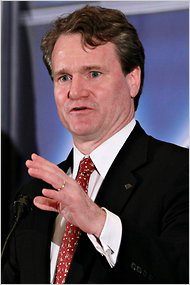11:23 a.m. | Updated
Seeking to unload one of its heaviest burdens from the financial crisis, Bank of America announced on Friday that it would pay $2.43 billion to settle litigation that had accused the bank of deceiving investors in the acquisition of Merrill Lynch.
The legal woes from that deal and the bank’s acquisition of the mortgage lender Countrywide Financial earlier in the financial crisis have dogged Bank of America as it tries to turn itself around.
For a federal securities class action, the size of the Merrill settlement is surpassed only by the those of Enron, WorldCom, Tyco and Cendant settlements, according to Joseph Grundfest, a professor specializing in securities litigation at Stanford University Law School.
Bank of America said that the settlement would hurt its results for the quarter, with it and other legal expenses costing it $1.6 billion. It also agreed to adopt a “say on pay” shareholder vote, an independent compensation committee of the board and policies for committees focused on acquisitions, among other corporate governance changes.
Bank of America announced a deal to buy Merrill Lynch for $50 billion in September 2008 as Lehman Brothers was preparing to file for bankruptcy. At the time, the two firms crowed about creating a financial giant unrivaled “in its breadth of financial services and global reach.” Bank of America executives emphasized Merrill’s “great global franchise” and its extensive network of financial advisers. The company said the deal would bolster earnings by 2010.
But by the time the deal closed in January 2009, Merrill Lynch’s health had deteriorated precipitously. The class action accused Bank of America of providing false and misleading statements that disguised huge losses at the Wall Street firm before shareholder votes to approve the merger.
Bank of America denied the allegations, but said it agreed to settle in order to put the cost litigation behind it. Under the proposed settlement, Bank of America has also agreed to beef up its corporate governance policies.
 Jeff Kowalsky/Bloomberg NewsBrian T. Moynihan, chief executive of Bank of America.
Jeff Kowalsky/Bloomberg NewsBrian T. Moynihan, chief executive of Bank of America.
“Resolving this litigation removes uncertainty and risk and is in the best interests of our shareholders,” Brian T. Moynihan, the bank’s chief executive, said in a statement. “As we work to put these long-standing issues behind us, our primary focus is on the future and serving our customers and clients.”
During the early years of the financial crisis, Bank of America appeared to be in better shape than its rivals because it had more ample coffers to acquire struggling lenders. Bank of America swooped in to buy two troubled firms. In 2008, Bank of America bought Countrywide Financial, the subprime mortgage lender. Later that year, Bank of America agreed to purchase Merrill.
But both deals have haunted the bank.
Since it acquired teetering Countrywide in 2008 just as the housing market was cratering, the deal has cost Bank of America more than $40 billion in losses on real-estate, legal costs and settlements, according to several people close to the bank. Within the bank, the purchase of the mortgage lender, has unleashed turmoil and regret. Mr. Moynihan, Bank of America’s chief executive, has publicly expressed regret, specifically about the timing of Countrywide’s purchase.
More than the timing, though, Bank of America has had to grapple with loans made by Countrywide. Founded 43 years ago, Countrywide promoted the virtues of owning a home for every American and made mortgages which have turned out to be some of the most troubled. The purchase of the lender effectively saddled Bank of America with hundreds of thousands of homeowners struggling to keep up with their mortgage payments.
Across the United States, Bank of America has had to spend billions of dollars to defend lawsuits related to Countrywide’s mortgage business. In the second quarter of 2011, for example, the bank reported an $8.8 billion loss, mainly related to a settlement with mortgage investors.
Earlier this year, Bank of America and four other banks agreed to a $26 billion settlement related to their foreclosure practices. That deal evolved from an investigation into the mortgage-servicing practices by all the 50 state attorneys general begun 2010 amid mounting fury over revelations that banks evicted homeowners from their homes with false or incomplete documentation.
Alone, the acquisition of Countrywide would have been enough to hobble growth at Bank of America, but coupled with the problematic purchase of Merrill Lynch, it has nearly crippled the institution. Mr. Moynihan has had to shutter bank branches, sell over billions in assets and slash tens of thousands of employees.
The marriage with Merrill began amid the financial turmoil of 2008. John Thain, the chief executive of Merrill, privately sought out Ken Lewis, the head of Bank of America, during a break in a crisis meeting at the Federal Reserve Bank of New York in lower Manhattan. Mr. Thain had realized that his firm was in critical condition and might not survive past the weekend. It was a shotgun wedding, and the two executives announced Sunday night that their firms were merging.
 Bebeto Matthews/Associated PressKen Lewis, former chief executive of Bank of America
Bebeto Matthews/Associated PressKen Lewis, former chief executive of Bank of America
The union was rocky from the start. While the deal gave Merrill a much-needed lifeline, the brokerage firm was still hemorrhaging money. Internal calculations showed Merrill, which was saddled with billions of dollars in souring mortgage assets, had a staggering pretax loss of more than $10 billion for October and November, and December was looking even worse.
At the same time, Bank of America and Merrill were pushing forward to close the deal by January 2009. On Dec. 5, at separate meetings in Charlotte, N.C., and New York, shareholders of each company voted to approve the deal. Just days before the shareholder meetings, bank executive expected Merrill to have a fourth-quarter loss of at least $16 billion, according to the shareholder lawsuit. But there was no public disclosure of that internal forecast.
In court documents, lawyers for Mr. Lewis have said that the executive was aware of the mounting losses heading into the shareholder meetings, but following discussions with lawyers he concluded that an interim disclosure was not necessary because the key regulatory filing in support of the merger didn’t contain projections on Merrill’s fourth-quarter results.
“The losses, though large, were not out of line with losses Merrill had experienced in prior quarters; and investors were well aware that banks were sustaining significant losses as the economy deteriorated,” according to a court filing filed by his lawyers in June 2013.
As the losses inside Merrill continued to build, some executives inside Bank of America considered abandoning the deal altogether. But regulators urged executives at Bank of America to continue, arguing that any reneged deal would surely cause further turmoil in the already roiling financial system. Instead, Bank of America received a fresh injection of capital to buffer against the Merrill losses.
On Jan. 16, weeks after the deal had closed, the bailout was announced along with Merrill’s fourth-quarter net loss of $15.31 billion. Shareholders, unaware of the severity of the losses in late 2008, were furious.
Neither Mr. Thain nor Mr. Lewis survived long after debacle. A week after the bailout was announced, Mr. Lewis flew to New York from Charlotte to see Mr. Thain, telling him the board blamed him for the losses. Mr. Thain has previously said he viewed this meeting as a firing.
In April 2009, Bank of America shareholders stripped Mr. Lewis of the title of chairman. By this time, lawsuits related to the merger were mounting and the Securities and Exchange Commission was investigating. Mr. Lewis announced his retirement from the bank a month later.
The bank later paid $150 million to settle an S.E.C. lawsuit that alleged the bank did not tell its shareholders about big bonus payments Merrill had approved before the merger clolsed.
Friday’s settlement won’t be the only black mark on the bank’s financials this quarter. The bank also said that profit would be hurt by a $1.9 billion adjustment related to the value of its debt. It also faces an $800 million charge related to a income tax expense.
In all, Bank of America said earnings would be cut by 28 cents a share. The company is set to report earnings on Oct. 17.
Article source: http://dealbook.nytimes.com/2012/09/28/bank-of-america-to-pay-2-43-billion-to-settle-class-action-over-merrill-deal/?partner=rss&emc=rss